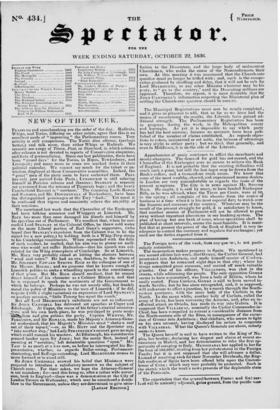NEWS OF THE WEEK.
FEASTING and speechmaking are the order of the day. Radicals, Whigs, and Tories, differing on other points, agree that this is an excellent mode of " improving " the Parliamentary recess. Tory activity is still conspicuous. The Tories dine oftener, (perhaps better,) and talk mere, than either Whigs or Radicals. We scarcely see acopy of Times, Post, or Standard, in which column after column is not devoted to reports of Conservative eloquence, and feats of gormandizing. Since our last publication, there have been "proud days" for the Tories, in Ripon, Tewkesbury, and Liverpool; and many more to come are marked down in their political calendar. We cannot say much for the talent or pas triotism displayed at these Conservative assemblies. Indeed, the "great" men of the party seem to have eschewed them. PEEL has only just arrived from Paris ; LYNDHURST is still solacing himself in Parisian saloons and theatres; STANLEY is scarcely yet recovered from the miasma of Tipperary bogs ; and the heavy Cumberland Baronet is" nowhere." The trimming Lords RIPON and SANDON, and Mr. DOWDESWELL of Tewkesbury, have been the distinguished personages at the Tory "feeds." Yet must it be confessed that vigour and unanimity relieve the stupidity of their reunions.
We mentioned last week that the Chancellor of the Exchequer had been talking nonsense and Whiggery at Limerick. Mr. RICE has more than once damaged his friends and himself by his speeches out of Parliament. We recollect that, when he suc- ceeded Lord STANLEY at the Colonial Office, he threw cold water on the more Liberal portion of Earl GREY'S supporters, (who hoped that STANLEY'S expulsion from the Cabinet was to be the signal for a new policy,) by holding forth in a Whig-Tory strain to his Cambridge constituents. When reproached with the folly of such conduct, he replied, that his aim was to please an audi- ence who would not suffer Radicalism—that his speech was cal- culated for the Whig atmosphere of Cambridge. So at Limerick, Mr. RICE very probably aimed at hitting the electors between "wind and water." He had an eye, doubtless, to the return of Mr. STEPHEN EDWARD SPRING RICE as the colleague of' one of the Messrs. ROCHE; and we presume that he knows enough of
Limerick politics to make a wheedling speech to the constituency of that place. But Mr. Rica should recollect, that he cannot divest himself of his character as a Cabinet Minister, and that he is supposed to speak the sentiments of the Government to which he belongs. Perhaps he was not merely silly, but frankly
stated the policy of Ministers to the men of Limerick : if he did, to quote (with a slight variation) an expression of Lord STANLEY'S on another occasion, "little Tommy has upset the coach."
But all Lad MELBOURNE'S subalterns are not so indiscreet. Sir JOHN CAMPBELL has delivered set speeches at Cupar and Edinburgh. At Cupar, the scene of his father's clerical ministra-
_sign*: and his own birth-place, he was privileged to prate mai- .. •
stiftglism and give polities the go-by. Captain Wrimvss, Mr. FERGUSON, and Sir RONALD, made his Majesty's Attorney-Gene- ral understand, that his Majesty's Ministers must "shake a reef out of their topsail,"—or, as Mr. HUTT and the Spectator say, "take another step ;" but Lady STRATHEDEN'S consort gave no sign which ceuhl commit his masters. At Edinburgh, his constituents pressed harder upon Sir JOHN; but the canny Scot, instead of sneerieg at "novelties," left debateable questions "open." Mr. TAIT is as much at a loss now, as before he interrogated his Re- presentative, whether, as regards Ballot-voting, Parliament- shortening, and Suffrage-extending, Lord MELBOURNE means to move forward or to stand still.
Sir JOHN CAMPBELL avowed his belief that Ministers were prepared to introduce a satisfactory measure on the subject of Church.rates. For their sakes, we hope the Attorney-General Is not mistaken; for—and this bring us,-after a rather wide excur- sion, bock to England—there was a demonstration at the City of London Tavern on Wednesday, which may be considered a death- blow to the Government, unless they are determined to give satis- faction to the Dissenters, and the large body of malecontent Churchmen, who make the cause of the Nonconformists their own. At this meeting it was announced that the Church-rate question must no longer be trifled with ; and, such is the exaspe- ration produced by shuffling and delay, that it will not be safe for Lord MELBOURNE, or any other Minister whatever may be his party, to " go to the country," until the Dissenting millions are appeased. Therefore, we repeat, it is most desirable that Sir JOHN CAMPBELL'S information respecting the Ministerial plan of settling the Church-rate question should be correct.


























